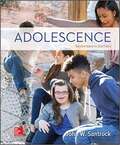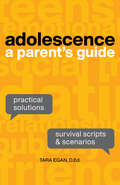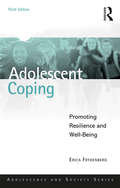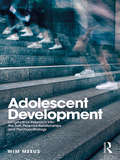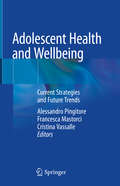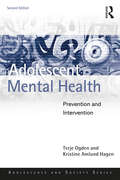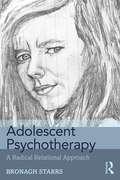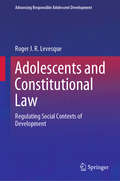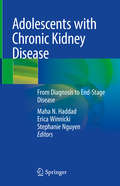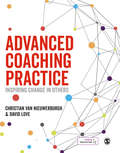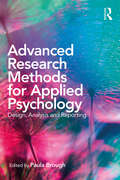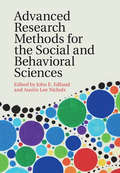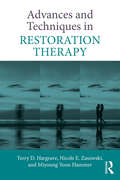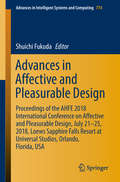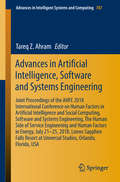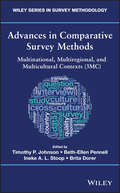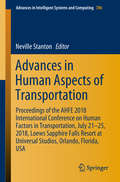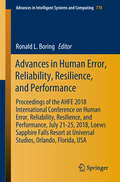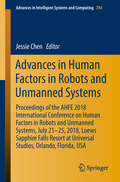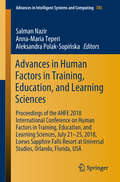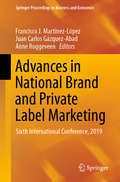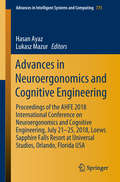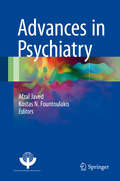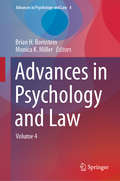- Table View
- List View
Adolescence
by John W. SantrockAs a master teacher, John Santrock connects current research with real-world application, helping students see how developmental psychology plays a role in their own lives and future careers. Through an integrated learning goals system, this comprehensive approach to adolescent development helps students gain the insight they need to study smarter, stay focused, and improve performance.
Adolescence: A Parent's Guide
by Tara Egan D.Ed.Survive adolescence—with the guide no parent should be without Getting through adolescence is tough, but you can help your child make it through—and maintain a strong relationship! Covering everything from late childhood to puberty to emerging adulthood, Adolescence: A Parent's Guide offers you and your child the kind of sound and thoughtful advice you'll wish you'd gotten in your adolescence. Divided into five chapters—each covering a specific age range—this guide digs deep into the most common aspects of adolescence. Whether it's dealing with dishonesty, managing changing relationships, or handling the age-old question of sex, this simple and straightforward guide has your back. You get a toolbox full of effective approaches that are easy to implement and can be tailored to your specific needs. Adolescence: A Parent's Guide includes: Understanding today's adolescents—Refresh your knowledge with the most modern and up-to-date information available. Actionable advice—Discover strategies for overcoming common adolescent hurdles—like when kids start testing limits or stressing out over social media. Talking it out—Sample scripts and scenarios provide helpful guidelines for navigating challenging conversations and situations with your growing child. Make sure the two of you get through adolescence in one piece with this comprehensive book.
Adolescent Coping: Promoting Resilience and Well-Being (Adolescence and Society)
by Erica FrydenbergHow do young people cope with the multitude of difficult situations and scenarios that are associated with growing up, like anxiety and depression, as well as illness, rejection and family breakdown? How can we facilitate and encourage, through a combination of health, well-being and positive mindset, healthy development during adolescence and beyond? With a substantial focus on the positive aspects of coping, including an emphasis on developing resilience and the achievement of happiness, Erica Frydenberg presents the latest developments in the field of coping. Adolescent Coping highlights the ways in which coping can be measured and implemented in a wide range of circumstances and contexts, with suggestions for the development of coping skills and coping skills training, and it provides strong scholarly evidence for the concepts and constructs that it promotes as providing a pathway to resilience. The work is framed as an ongoing interaction between individuals and their environments as represented by the psychosocial ecological model of Bronfenbrenner. The major theories of coping are articulated that take account of the transactional model, resources theories and proactive models of coping. Areas of recent interest such as neuroscience and epigenetics are included, alongside a new chapter, ‘Cyberworld’, which provides insights on new and relevant topics such as mindfulness and the impact of social media as they relate to coping in the contemporary context. Adolescent Coping will be of interest to practitioners in psychology, social work, sociology, education and youth and community work as well as to students on courses in adolescent development in these fields.
Adolescent Development: Longitudinal Research into the Self, Personal Relationships and Psychopathology
by Wim MeeusThis groundbreaking book provides students and researchers with a unique overview of the longitudinal study of the development of young people from the ages of 12 to 25. It offers a comprehensive introduction into the multiple theories on the development of the self, personal relationships and psychopathology in adolescence, alongside a non-statistical overview of the many longitudinal models used to study development. The book includes key topics such as the development of the self, adolescent identity and personality; the development of parent-adolescent relationships; friendships and the understanding of others; and the development of psychosocial problems such as anxiety, depression, delinquency, aggression, and substance use. Meeus highlights multiple findings showing how these processes are integrated and identifies eight fundamental patterns of adolescent development to help determine why most adolescents develop into mature and organized individuals towards the end of this life stage, whilst a substantial minority show an inability to mature. It is essential reading for graduate students and researchers in adolescent development and anyone seeking to use longitudinal research methodology in the social and behavioral sciences.
Adolescent Health and Wellbeing: Current Strategies and Future Trends
by Alessandro Pingitore Francesca Mastorci Cristina VassalleThis book presents a detailed and updated review of the widespread changes that take place during adolescence, adopting a preventive perspective that reflects physical, social, cognitive, and emotional changes. It addresses a broad range of aspects, including: the preventive programs and their systemic effects; the role of environment in influencing the healthy behaviors of adolescents and young adults; the use of e-Health technology in health and behavioral interventions for adolescents; and the clinical and prognostic implications of primordial prevention in healthy adolescents. All of these elements are subsequently reviewed using a multidimensional approach, in order to offer extensive information on the complex changes that characterize adolescents’ physiological, psychological, and neurobiological development.In addition, the book depicts the preventive strategies currently used in various social settings (school, family, sport club, health policies) aimed not only at reducing lifestyle risk behaviors, but also at improving resilience, happiness, social involvement, self-esteem, and sociability. This update is essential in the light of the fact that, to date, prevention has mainly been directed towards adolescents with physical or mental disorders rather than their healthy peers. As such, the book offers a valuable tool for pediatricians, child and adolescents psychiatrists, and for all professionals involved in Health Promotion and Disease Prevention.
Adolescent Mental Health: Prevention and Intervention (Adolescence and Society)
by Terje Ogden Kristine Amlund HagenAdolescence is a period characterized by both increased susceptibility to risks and new-found strength to withstand them. Whilst most young people are well equipped to manage the changes associated with growing up, other maladjusted and marginalized adolescents already have, or are at risk of developing, mental health problems. Adolescent Mental Health: Prevention and Intervention is a concise and accessible overview of our current knowledge on effective treatment and prevention programs for young people with mental health problems. Whilst addressing some of the most common mental health issues among young people, such as behavioral problems and drug-related difficulties, it also offers a fuller understanding of the evidence-based treatment and prevention programs that are built upon what we know about how these behavioral and emotional problems develop and are sustained. The volume illustrates contemporary and empirically supported interventions and prevention efforts through a series of case studies. It has been fully updated in line with the latest NICE and DSM-V guidelines, and now includes an added chapter on implementation, and what factors facilitate implementation processes of intervention efforts. Adolescent Mental Health: Prevention and Intervention will be essential reading for students and practitioners in the fields of child welfare and mental health services, and any professional working with adolescents at risk of developing mental health problems.
Adolescent Psychotherapy: A Radical Relational Approach
by Bronagh StarrsCounsellors and psychotherapists are faced with ever-increasing complexity in their work with adolescents. In this book, Bronagh Starrs offers an understanding of developmental and therapeutic process from a relational-phenomenological Gestalt perspective. Starrs shows how the adolescent’s presenting symptom issues are statements of compromised lifespace integrity and demonstrates therapeutic sensibility to the adolescent’s first-person experience. Throughout the book, the clinician is offered extensive relational and creative strategies to support integrity repair for the adolescent. The developmental impact of various lifespace contexts are discussed, including parental separation, complex family configuration, grief, adoption, and emerging sexual orientation and gender experience. Therapeutic responses to common creative adjustments are explored including anxiety, school refusal, depression, self-harm, suicide, eating disorders, alcohol and drug use, and sexual trauma. Adolescent Psychotherapy: A Radical Relational Approach will help counsellors and psychotherapists to develop deeper levels of competency in their work as adolescent psychotherapists, as they navigate the complex and fascinating experience of therapy with teenagers. This exceptional contribution is highly suitable for both experienced practitioners and students of counselling and psychotherapy.
Adolescents and Constitutional Law: Regulating Social Contexts of Development (Advancing Responsible Adolescent Development)
by Roger J. LevesqueThis textbook offers a foundation for understanding adolescents’ rights by articulating the complexity, breadth, and challenging nature of laws regulating adolescents. It showcases the Supreme Court’s key interpretations of the Constitution as it relates to adolescents’ rights. Chapters examine relevant legal systems and the social contexts that legal systems control. In addition, chapters discuss constitutional issues and their nuances through actual cases that often offer alternative interpretations of constitutional rules. The textbook guides readers through both well accepted and often ignored conceptions of adolescents’ rights. It offers readers unfamiliar with the law the tools they need to understand the importance of adolescents’ constitutional rights and how they can contribute to developing them. Topics featured in this text include: The role of parents and family systems in conceptualizing adolescents’ rights.The complexities of providing health care to adolescents.Religious freedom and adolescents’ rights relating to religion.The flaws of child welfare systems.The challenge of developing rights specifically for juveniles and delinquent youth.Juvenile court systems and the differential treatment of adolescents.The difference between the juvenile court system and the criminal court system.Adolescents’ media rights. Adolescents and Constitutional Law is an essential textbook for graduate students as well as a must-have reference for researchers/professors and related professionals in developmental psychology, juvenile justice/youth offending, social work, psychology and law, family studies, constitutional law, and other interrelated disciplines.
Adolescents with Chronic Kidney Disease: From Diagnosis to End-Stage Disease
by Maha N. Haddad Erica Winnicki Stephanie NguyenEnd-stage renal disease is a devastating diagnosis to the patient, family and their care provider. This book covers all aspects of chronic kidney disease from a general description to its psychological impact on the adolescent and lastly its progression to end-stage and dialysis. It details the important aspects of the patient’s journey from diagnosis to their final destination including transplant and discussion of the medications used. It includes chapters on important etiologies of chronic kidney disease in adolescence, addressing the particular challenges a provider may be faced with in caring for this age group, and finally transition of their care to adult care providers. Written by experts in the field of pediatrics and nephrology Adolescents with Chronic Kidney Disease is the definitive resource in diagnosing and transitioning patients with chronic kidney disease.
Advanced Coaching Practice: Inspiring Change in Others
by David Love Dr. Christian van NieuwerburghHighly respected coaches Christian van Nieuwerburgh and David Love help you to develop your coaching practice, bridging the gap between beginner and advanced coach. You’ll have access to 15 videos that illustrate and analyse the book’s key themes, helping you to extend your learning and enhance your reflective practice, allowing you a rare extra insight into the coaching conversation. This is a must-read for trainees at the later stages of a coaching qualification, and experienced practitioners looking to broaden and develop their practice. A note to customers: Those purchasing a physical copy of the book will have an access code that allows you to access the video content. Those purchasing an ecopy will need to email digitalcontent@sagepub.co.uk with 'ACCESS CODE REQUIRED' in the subject line to request your access code. Please remember to indicate that this is for van Nieuwerburgh & Love 'Advanced Coaching Practice'
Advanced Coaching Practice: Inspiring Change in Others
by David Love Dr. Christian van NieuwerburghHighly respected coaches Christian van Nieuwerburgh and David Love help you to develop your coaching practice, bridging the gap between beginner and advanced coach. You’ll have access to 15 videos that illustrate and analyse the book’s key themes, helping you to extend your learning and enhance your reflective practice, allowing you a rare extra insight into the coaching conversation. This is a must-read for trainees at the later stages of a coaching qualification, and experienced practitioners looking to broaden and develop their practice. A note to customers: Those purchasing a physical copy of the book will have an access code that allows you to access the video content. Those purchasing an ecopy will need to email digitalcontent@sagepub.co.uk with 'ACCESS CODE REQUIRED' in the subject line to request your access code. Please remember to indicate that this is for van Nieuwerburgh & Love 'Advanced Coaching Practice'
Advanced Research Methods for Applied Psychology: Design, Analysis and Reporting
by Paula BroughThis is the first comprehensive guide to the range of research methods available to applied psychologists. Ideally suited to students and researchers alike, and covering both quantitative and qualitative techniques, the book takes readers on a journey from research design to final reporting. The book is divided into four sections, with chapters written by leading international researchers working in a range of applied settings: Getting Started Data Collection Data Analysis Research Dissemination With coverage of sampling and ethical issues, and chapters on everything from experimental and quasi-experimental designs to longitudinal data collection and focus groups, the book provides a concise overview not only of the options available for applied research, but also of how to make sense of the data produced. It includes chapters on organizational interventions and the use of digital technologies, and concludes with chapters on how to publish your research, whether it’s a thesis, journal article or organisational report. This is a must-have book for anyone conducting psychological research in an applied setting.
Advanced Research Methods for the Social and Behavioral Sciences
by John E. Edlund Austin Lee NicholsWritten by an interdisciplinary team of global experts covering diverse research methods - including research design, research tools, and statistical techniques - this volume focuses on advanced research methods for anyone working in the social and behavioral sciences. The information needed to perform research in the laboratory, the field, or online is mapped out to provide specific applications and tools in applying each method. The issues surrounding reliability, validity, and obtaining consent are explained alongside detailed descriptions of the impact of pre-knowledge on participant behavior, the ways that researchers unintentionally influence participants, and tips on administering suspicion probes and debriefings. The book then lays out bio-physiological measures, eye-tracking methods and technologies, the construction of questionnaires, and reaction-time methodologies without assuming too much prior knowledge. The basics of Bayesian analysis, item response analysis, social network analysis, and meta-analysis are also summarised as the editors combine innovative methods and statistics to showcase how to perform quality research.
Advances and Techniques in Restoration Therapy
by Terry D. Hargrave Nicole E. Zasowski Miyoung Yoon HammerAdvances and Techniques in Restoration Therapy focuses on the practical elements of the Restoration Therapy Model to help mental health professionals working with individuals, couples, and families, to restore broken identities and senses of safety, and to move toward action that is functional and healing. Richly illustrated with case examples from experienced clinicians, this volume brings new insights and a range of established and emerging therapeutic techniques to the framework and Restoration Therapy community. This is an innovative and much-needed step-by-step manual, which will provide marriage and family therapists and counselors with practical ways of applying key interventions to varied situations of pain, to help clients find functional, healing solutions with integrity.
Advances in Affective and Pleasurable Design: Proceedings of the AHFE 2018 International Conference on Affective and Pleasurable Design, July 21-25, 2018, Loews Sapphire Falls Resort at Universal Studios, Orlando, Florida, USA (Advances in Intelligent Systems and Computing #774)
by Shuichi FukudaThis book discusses the latest advances in affective and pleasurable design. Further, it reports on important theoretical and practical issues, covering a wealth of topics including aesthetics in product and system design, design-driven innovation, affective computing, evaluation tools for emotion, Kansei engineering for products and services, and many more. Based on the AHFE 2018 International Conference on Affective and Pleasurable Design, held on July 21–25, 2018, in Orlando, Florida, USA, the book provides a timely survey and inspiring guide for all researchers and professionals involved in design, e.g. industrial designers, emotion designers, ethnographers, human–computer interaction researchers, human factors engineers, interaction designers, mobile product designers, and vehicle system designers.
Advances in Artificial Intelligence, Software and Systems Engineering: Joint Proceedings of the AHFE 2018 International Conference on Human Factors in Artificial Intelligence and Social Computing, Software and Systems Engineering, The Human Side of Service Engineering and Human Factors in Energy, July 21–25, 2018, Loews Sapphire Falls Resort at Universal Studios, Orlando, Florida, USA (Advances in Intelligent Systems and Computing #787)
by Tareq Z. AhramThis book focuses on emerging issues following the integration of artificial intelligence systems in our daily lives. It focuses on the cognitive, visual, social and analytical aspects of computing and intelligent technologies, highlighting ways to improve technology acceptance, effectiveness, and efficiency. Topics such as responsibility, integration and training are discussed throughout. The book also reports on the latest advances in systems engineering, with a focus on societal challenges and next-generation systems and applications for meeting them. It also discusses applications in smart grids and infrastructures, systems engineering education as well as defense and aerospace. The book is based on both the AHFE 2018 International Conference on Human Factors in Artificial Intelligence and Social Computing, Software and Systems Engineering, The Human Side of Service Engineering and Human Factors in Energy, July 21–25, 2018, Loews Sapphire Falls Resort at Universal Studios, Orlando, Florida, USA.
Advances in Comparative Survey Methods: Multinational, Multiregional, and Multicultural Contexts (3MC) (Wiley Series in Survey Methodology)
by Timothy P. Johnson Beth-Ellen Pennell Ineke A. Stoop Brita DorerCovers the latest methodologies and research on international comparative surveys with contributions from noted experts in the field Advances in Comparative Survey Methodology examines the most recent advances in methodology and operations as well as the technical developments in international survey research. With contributions from a panel of international experts, the text includes information on the use of Big Data in concert with survey data, collecting biomarkers, the human subject regulatory environment, innovations in data collection methodology and sampling techniques, use of paradata across the survey lifecycle, metadata standards for dissemination, and new analytical techniques. This important resource: Contains contributions from key experts in their respective fields of study from around the globe Highlights innovative approaches in resource poor settings, and innovative approaches to combining survey and other data Includes material that is organized within the total survey error framework Presents extensive and up-to-date references throughout the book Written for students and academic survey researchers and market researchers engaged in comparative projects, this text represents a unique collaboration that features the latest methodologies and research on global comparative surveys.
Advances in Human Aspects of Transportation: Proceedings of the AHFE 2018 International Conference on Human Factors in Transportation, July 21-25, 2018, Loews Sapphire Falls Resort at Universal Studios, Orlando, Florida, USA (Advances in Intelligent Systems and Computing #786)
by Neville StantonThis book discusses the latest advances in research and development, design, operation and analysis of transportation systems and their complementary infrastructures. It reports on both theories and case studies on road and rail, aviation and maritime transportation. Further, it covers a wealth of topics, from accident analysis, vehicle intelligent control, and human-error and safety issues to next-generation transportation systems, model-based design methods, simulation and training techniques, and many more. A special emphasis is placed on smart technologies and automation in transport, and on the user-centered, ergonomic and sustainable design of transport systems. The book, which is based on the AHFE 2018 International Conference on Human Factors in Transportation, held in Orlando, Florida, USA on July 21–25, 2018, mainly addresses the needs of transportation system designers, industrial designers, human–computer interaction researchers, civil and control engineers, as well as vehicle system engineers. Moreover, it represents a timely source of information for transportation policy-makers and social scientists whose work involves traffic safety, management, and sustainability issues in transport.
Advances in Human Error, Reliability, Resilience, and Performance: Proceedings of the AHFE 2018 International Conference on Human Error, Reliability, Resilience, and Performance, July 21-25, 2018, Loews Sapphire Falls Resort at Universal Studios, Orlando, Florida, USA (Advances in Intelligent Systems and Computing #778)
by Ronald L. BoringThis book brings together studies broadly addressing human error from different disciplines and perspectives. It discusses topics such as human performance; human variability and reliability analysis; medical, driver and pilot error, as well as automation error; root cause analyses; and the cognitive modeling of human error. In addition, it highlights cutting-edge applications in safety management, defense, security, transportation, process controls, and medicine, as well as more traditional fields of application. Based on the AHFE 2018 International Conference on Human Error, Reliability, Resilience, and Performance, held on July 21–25, 2018, in Orlando, Florida, USA, the book includes experimental papers, original reviews, and reports on case studies, as well as meta-analyses, technical guidelines, best practice and methodological papers. It offers a timely reference guide for researchers and practitioners dealing with human error in a diverse range of fields.
Advances in Human Factors in Robots and Unmanned Systems: Proceedings of the AHFE 2018 International Conference on Human Factors in Robots and Unmanned Systems, July 21-25, 2018, Loews Sapphire Falls Resort at Universal Studios, Orlando, Florida, USA (Advances in Intelligent Systems and Computing #784)
by Jessie ChenThis book focuses on the importance of human factors in the development of safe and reliable unmanned systems. It discusses current challenges such as how to improve the perceptual and cognitive abilities of robots, develop suitable synthetic vision systems, cope with degraded reliability in unmanned systems, predict robotic behavior in case of a loss of communication, the vision for future soldier–robot teams, human–agent teaming, real-world implications for human–robot interaction, and approaches to standardize both the display and control of technologies across unmanned systems. Based on the AHFE 2018 International Conference on Human Factors in Robots and Unmanned Systems, held on July 21–25, 2018, in Orlando, Florida, USA, this book fosters new discussions and stimulates new advances in the development of more reliable, safer, and highly functional devices for carrying out automated and concurrent tasks.
Advances in Human Factors in Training, Education, and Learning Sciences: Proceedings of the AHFE 2018 International Conference on Human Factors in Training, Education, and Learning Sciences, July 21-25, 2018, Loews Sapphire Falls Resort at Universal Studios, Orlando, Florida, USA (Advances in Intelligent Systems and Computing #785)
by Salman Nazir Anna-Maria Teperi Aleksandra Polak-SopińskaThis book focuses on the importance of human factors in optimizing the learning and training process. It reports on the latest research and best practices and discusses key principles of behavioral and cognitive science, which are extremely relevant to the design of instructional content and new technologies to support mobile and multimedia learning, virtual training and web-based learning, among others, as well as performance measurements, social and adaptive learning and many other types of educational technologies, with a special emphasis on those important in the corporate, higher education, and military training contexts. Based on the AHFE 2018 Conference on Human Factors in Training, Education, and Learning Sciences, held July 21–25, 2018 in Orlando, Florida, USA on July 21–25, 2018, the book offers a timely perspective on the role of human factors in education. It highlights important new ideas and will fosters new discussions on how to optimally design learning experiences.
Advances in National Brand and Private Label Marketing: Sixth International Conference, 2019 (Springer Proceedings in Business and Economics)
by Francisco J. Martínez-López Juan Carlos Gázquez-Abad Anne RoggeveenThe 2019 International Conference on National Brand & Private Label Marketing is a unique academic forum for presenting and discussing original, rigorous and significant contributions from researchers around the world on marketing issues that retailers, store brand managers and national brand managers are facing.The three-day event covered a wide range of topics from varied fields including retailing, marketing, general business, psychology, economics and statistics. Further, it addressed diverse areas of application such as innovation, retail market structure, social media, consumer decision-making, store loyalty, assortment size, digital transformation, ethical aspects, cultural dimensions, and private label pricing. This volume gathers the proceedings of the 2019 NB&PL marketing conference in a collection of outstanding contributions that employ a wide variety of theoretical and methodological approaches.
Advances in Neuroergonomics and Cognitive Engineering: Proceedings of the AHFE 2018 International Conference on Neuroergonomics and Cognitive Engineering, July 21–25, 2018, Loews Sapphire Falls Resort at Universal Studios, Orlando, Florida USA (Advances in Intelligent Systems and Computing #775)
by Hasan Ayaz Lukasz MazurThis book offers a broad perspective on the field of cognitive engineering and neuroergonomics, covering emerging practices and future trends toward the harmonious integration of human operators and computer systems. It presents novel theoretical findings on mental workload and stress, activity theory, human reliability, error and risk, and neuroergonomic measures alike, together with a wealth of cutting-edge applications. Further, the book describes key advances in our understanding of cognitive processes, including mechanisms of perception, memory, reasoning, and motor response, with a special emphasis on their role in interactions between humans and other elements of computer-based systems. Based on the AHFE 2018 affiliated conference on Neuroergonomics and Cognitive Engineering, held on July 21–25, 2018, in Orlando, Florida, USA, it provides readers with a comprehensive overview of the current challenges in cognitive computing and factors influencing human performance.
Advances in Psychiatry
by Kostas N. Fountoulakis Afzal JavedThis book will be the newest edition on the series ‘advances in psychiatry’. The previous 3 volumes can be found online at http://www.wpanet.org/detail.php?section_id=10&content_id=660 . They were highly successful in covering a broad area of psychiatry from different perspectives and angles and by reflecting both specialized but also international and global approaches. This series have guaranteed quality therefore can be used by different scientific groups for teaching and learning and also as a means for fast dissemination of advanced research and transformation of research findings into the everyday clinical practice. There is already a body of readers anticipating the next volume.
Advances in Psychology and Law: Volume 4
by Brian H. Bornstein Monica K. MillerThe present volume consists of up-to-date review articles on topics relevant to psychology and law, and will be of current interest to the field. Notably, the majority of these topics are currently attracting a great deal of research and public policy attention in the U.S. and elsewhere, as evidenced by programs at the American Psychology-Law Society and related conferences. Topics for the present volume include: attitudes toward the police (Cole et al.), alibis (Charman et al.), hate crimes based on gender and sexual orientation (Plumm & Leighton), the role of gender at trial (Livingston et al.), neuroimages in court (Glen), intimate partner violence (Mauer & Reppucci), post-identification feedback (Douglass & Smalarz) and individual differences in eyewitness identification (Snowden & Bornstein), veterans’ wellbeing (Berthelot & Prager), and plea bargaining (Levett).
